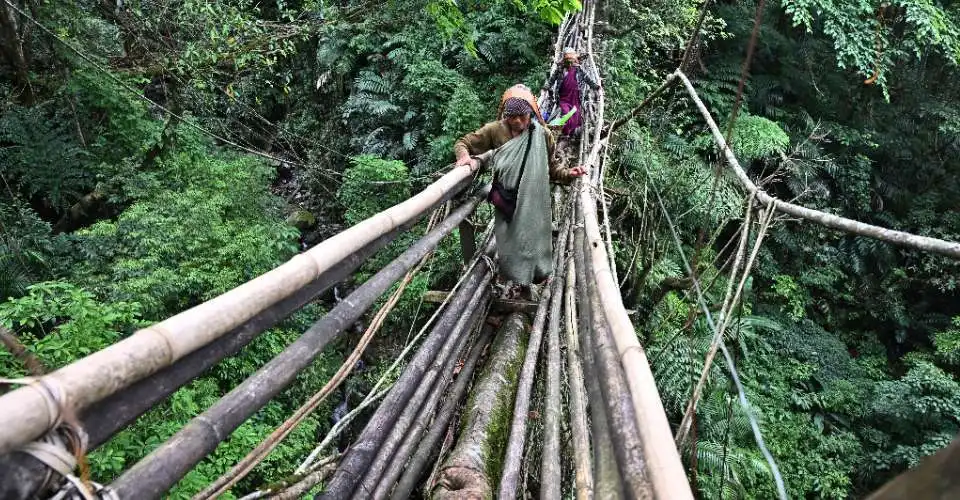The Narendra Modi government has drawn up a plan to bring peace to the volatile northeastern region housing the nation’s only three Christian-majority states after the mammoth national elections end early next month.
"Peace in the northeastern states, including Manipur, and end of various conflicts, is a priority," said an official with India’s internal security ministry.
On May 26, India conducted the sixth phase of elections to the 543-member Lok Sabha (lower house), involving 969 million voters. The last phase of the seven-phased polls is slated for June 1, and the results will be available on June 4.
Tribal women walk across a root bridge in Meghalaya on May 9. India’s northeastern region, comprising eight states, is known for its ethnic violence (Photo: AFP/UCAN )
The polls in the northeastern states, including Christian-majority Meghalaya, Nagaland, and Mizoram, have already been completed.
“Things are delayed due to the ongoing election process,” the official added on condition of anonymity due to the sensitive nature of India’s northeastern region, bordering communist China on the north, civil war-hit Myanmar (east), Muslim-majority Bangladesh (south), and Buddhist-majority Bhutan (west).
More than 220 people, most of them Christians, have died in Manipur, where Kukis tribal Christians have been fighting Meitei Hindus since May 3 last year over conferring the tribal status on Hindus to get benefits under India’s affirmation action policy. Christians account for 41 percent of the hilly state’s 3.6 million population.
Since 2021, Christian-majority Mizoram has been witnessing the arrival of migrants from Myanmar after the coup of the civilian government by the Myanmar military.
Myanmar, the world’s largest opium-producing nation, shares borders with Mizoram's three districts -- Hnahthial, Champhai and Lawngtlai.
People in Myanmar’s Christian-majority Chin state have family relations with people in the Christian-dominated Indian state of Mizoram. India is planning to seal the Myanmar-India border and end the free movement of people.
The Indian government has termed the ethnic violence in Manipur as part of narco-terrorism. However, tribal Christians have accused the pro-Hindu government of Prime Minister Narendra Modi of supporting Hindus.
"The government is taking stock of the situation in Manipur and Mizoram,” the official told UCA News. “Ethnic clashes cannot be checked by force," he admitted.
On May 17, led by a Church group, warring tribal Christians and Hindus in Manipur met for the first time to end the one-year-old sectarian strife.
Over a dozen influential leaders from the Meitei Hindu and Kuki Christian communities attended the first-ever meeting held at Bosco Reach Out, a Salesian house in Guwahati, Assam, the largest northeastern state bordering Bangladesh.
According to a senior Mizoram government official, a fresh batch of 1,430 refugees from Myanmar have taken shelter in the state since May 17 after fighting between the army and armed rebels escalated in the military-ruled neighboring nation.
The cash-starved Mizoram government has sought financial aid from the federal government to settle the migration crisis. In Mizoram, which shares borders between Bangladesh and Myanmar, Christians form close to 90 percent of the state's 1.1 million people.
Nagaland has witnessed many armed struggles over the years with demands for separation from India. The Naga rebellion reached its zenith in 1956 and the state has reported massacres throughout years of struggle.
People in six districts of the Christian-majority Nagaland refused to vote in the ongoing national election to stress their demand for a separate state. Christians account for 87 percent of Nagaland’s 2.2 million people.
The official added that the government of India is keen to work on a peace pact with multiple Naga insurgent groups.
ends






No comments:
Post a Comment